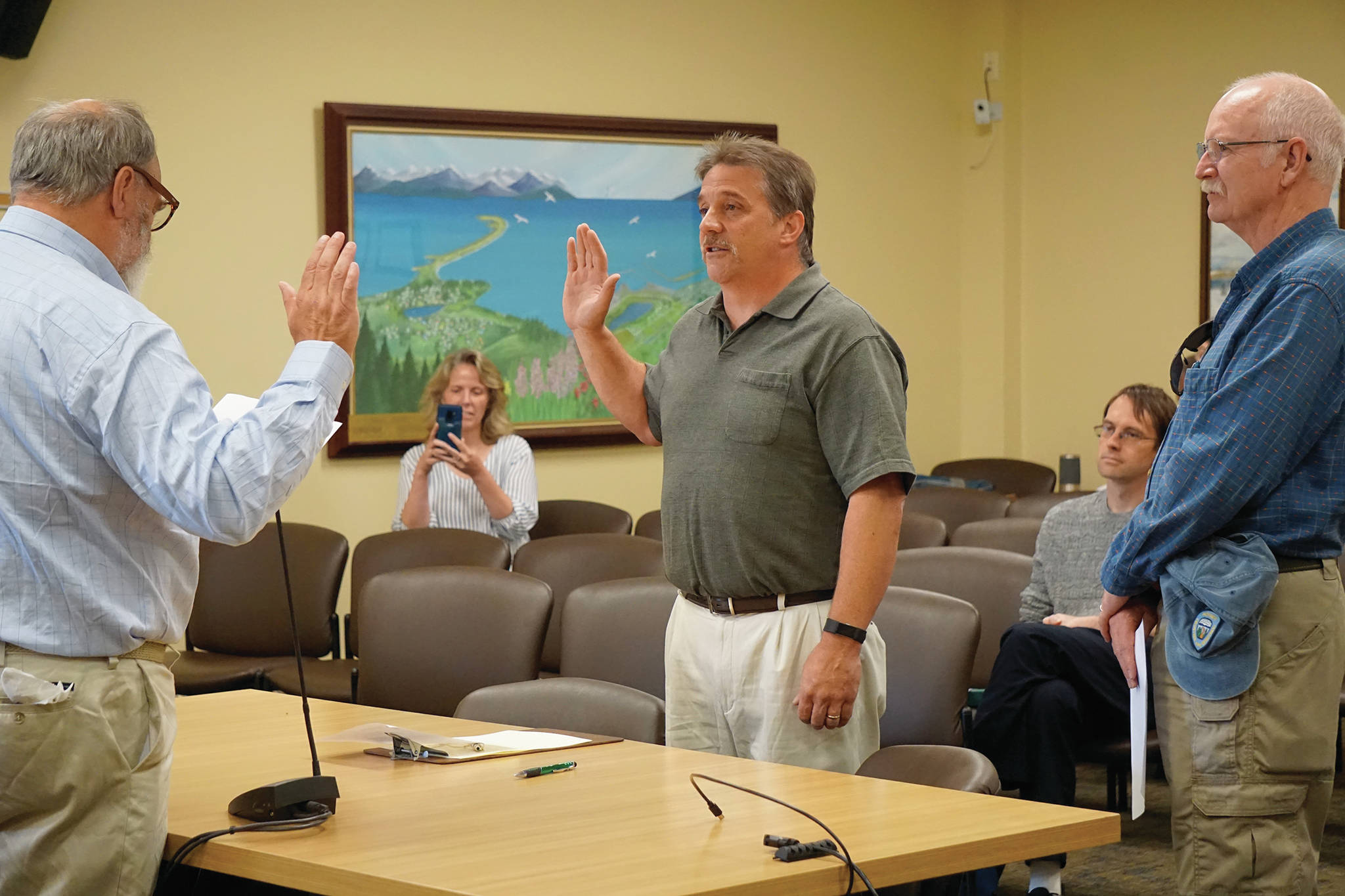As the Alaska Legislature continued meeting this week in Juneau at Gov. Mike Dunleavy’s direction to consider funding a capital budget and an Alaska Permanent Fund, the Homer City Council at its regular meeting Monday unanimously approved a letter calling on the governor and legislators “to restore state funding that was vetoed and asks Governor Dunleavy to maintain the restored funding.”
In other work, the council mostly postponed action on a slate of ordinances introduced or continued at the July 22 meeting.
Signed by Homer Mayor Ken Castner and all six council members, the three-page letter outlines the effects to Homer should Dunleavy’s $444 million in vetoes stand. Those include:
• Impacts of $130 million in cuts to the University of Alaska and to the Kachemak Bay Campus,
• The ability of the University of Alaska to maintain its partnership with the Kachemak Bay National Estuarine Research Reserve and the National Oceanic and Atmospheric Adminstration’s Kasitsna Bay Laboratory,
• Impacts of $49 million in statewide school debt bond reimbursement on the Kenai Peninsula Borough School District and reductions of teachers and support staff,
• The loss of Medicaid dental care to 300 area adults through the SVT Health Clinic,
• The loss of potentially hundreds of thousands of dollars of Medicaid funding to South Peninsula Hospital,
• The loss of support for Homer Head Start and the Best Beginnings program,
• The loss of $250,000 in state grants to South Peninsula Behavioral Health Services,
• The loss of $60,000 to South Peninsula Haven House for its homeless assistance program,
• Impacts on about 1,200 peninsula seniors who received needs-based benefits on the senior benefits program, cut by Dunleavy’s vetoes, and
• Impacts on funding for arts agencies receiving grants from the Alaska State Council on the Arts, now closed, and the Online With Libraries program.
The letter notes how the City of Homer has already endured previous state budget cuts, such as the loss of 45% in funding for the city’s shared prisoner space at the Homer Jail. The city also restructured its sales tax to cover operations and paid its own way for a new police station.“
The City of Homer and its residents have stepped up to the plate,” the letter reads. “There is no room in our budget or tax base for further cost shifting by the State.”
A draft letter written by Castner was amended to ask that the Legislature and the governor “look for a combination of revenue sources that will address the needs of a healthy society.”
The letter suggested examining the oil tax structure and exploring an income tax. A suggestion that the governor and legislature cap the Permanent Fund Dividend was changed to read “following revenue enhancements from the two sources listed above, revisit the formula that supports the Alaska Permanent Fund Dividend Program.”
In speaking about the letter at Monday’s meeting, Castner noted an action that failed by one vote to reverse the sweep of about $110 million from accounts such as the University of Alaska scholarship fund into the general fund — a routine action that happens at the end of the fiscal year and that past Legislatures without debate have put back into the appropriate accounts. Rep. Sarah Vance, R-Homer, voted against the reverse sweep and a capital budget.
Castner said he tried to call Vance “on every number possible,” but could not reach her to share his concerns. The failure to fund scholarships “has put every student who had any kind of financial assistance coming from the University of Alaska system in complete suspense. Those kids need help,” he said.
Most of the debate on Monday concerned Ordinance 19-35, an ordinance that would change the city’s budget cycle from a 1-year to a 2-year cycle. On a 6-0 vote, the council approved introducing the ordinance. It comes up for a second reading and public hearing on Aug. 12. The council had earlier approved moving forward with a biennial budget. Ordinance 19-35 implements that.
Council member Rachel Lord said she wanted to make sure the council carefully considered changes to its code.“
I think there is a lot of work to be done in fleshing this out,” Lord said. “…There are a lot of policy questions.”
Council member Caroline Venuti also said she had concerns about rushing into the biennial budget.
“What is the rush?” she asked. “I remember (Council member) Shelly (Erickson) saying, ‘I don’t want to be rushed into a decision.”
Council member Tom Stroozas said the change wasn’t a big deal.“
Forecasting a budget up to two years shouldn’t bring a lot of heartburn, and besides, budgets can be adjusted,” he said. “Planning out two years gives us a better idea of where we’re going.”
City Manager Katie Koester noted that to meet the administration’s deadline of introducing a draft budget in October, it has to start now on the budget. She is proceeding as if there will be a biennial budget. To help answer questions on the biennial budget concept, the council also agreed to hold a work session before the Aug. 12 meeting.
In other action, the council:
• Approved a 1-year contract with Premera Blue Cross, VSP, and Prudential for city health insurance,
• Postponed to Aug. 12 consideration of Ordinance 19-23(S), repealing and reenacting Homer City Code regarding Homer Public Utility Systems,
• Passed unanimously an amendment to city code making medical clinics a permitted use in the Central Business District,
• Referred to the Homer Advisory Planning Commission an ordinance that would change its name to the Planning Commission
• Awarded a $145,850 contract to Building Specialties of Anchor Point to demolish the A-frame water tank at the top of Main Street near Bayview Park — the city’s first water tank and part of the $500,000 system that brought clean drinking water to Homer in 1966. The Homer City Council holds its next regular meeting at 6 p.m. Aug. 12 in the Cowles Council Chambers, Homer City Hall.


